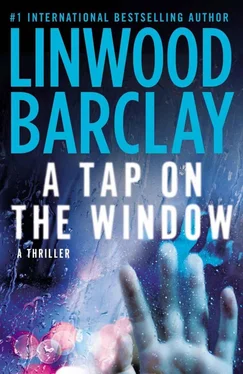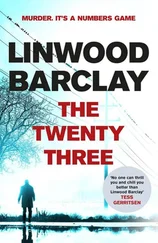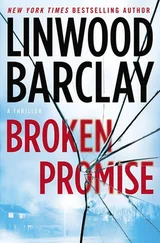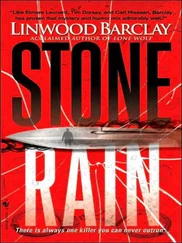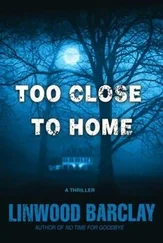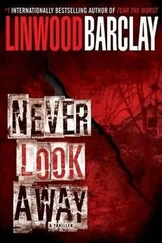A white Ford Explorer and a dark blue Lexus were parked in the double driveway. I pulled in behind the Explorer, got out, crossed the flagstone walk to the front door, and rang the bell.
I could hear muffled shouting inside. A man’s voice asking if someone was going to get it, a woman saying he was closer. I waited, figuring that sooner or later someone would get here.
The door was opened by a silver-haired man in his late forties, early fifties, probably just home from work. The collar of his crisp white shirt was unbuttoned, his tie askew, the cuffs of his dress pants rested on black socks instead of shoes. The big toe of his right foot was peeking at me through a hole. In his hand was an oversized wineglass that was half full of red.
“Yeah?” he said.
“Mr. Rodomski?” I said.
“Whatever it is, we don’t want any.”
“I’m not selling. I’m here to—”
“Who is it, Chris?” a woman shouted from someplace else in the house.
He swiveled his head around, yelled, “I don’t know!” Then, back to me, he said, “What’d you say you’re selling?”
“I said I wasn’t. My name is Cal Weaver. I’m a private investigator.” I extended a hand.
Chris Rodomski shook my hand, which was clammy enough to make me sorry I’d offered it. “Really?” he said.
I took out my wallet and displayed my license for half a second. I could have allowed him a closer look, but his eyes were glassy and I didn’t see the point.
A woman I presumed was his wife appeared at the bottom of the stairs and turned toward the door. Big hair, auburn in color, and a little too much lipstick, suggesting to me that when she was little, she had a hard time coloring within the lines. Her cheeks were overly rouged, almost clownlike. She had a glass of red wine in her hand as well, but it was just about ready for a refill.
“Who’s this?” she said to her husband. There was a hint of slurring. She hadn’t reached total inebriation, although I had a sense it was her destination.
“It’s a detective, Glynis.”
“The police?” she said, and the skin beyond the red circles on her cheeks instantly paled. She set the glass down on the closest surface, a side table.
I told her my name. “I’m not with the police. I’m private.”
“What’s this about?” She’d put one hand to her chest, as though checking to see how quickly her heart was beating.
“I’m sure everything is fine,” her husband said. He looked at me apologetically. “Glynis always assumes the worst.”
“That’s because that’s how things usually turn out,” she shot back.
“May I come in?” I asked, nodding toward the living room.
“Just tell me if it’s about Hanna,” Glynis Rodomski said. “I have to know if this is about Hanna.”
“It is,” I conceded. “At least, in part. Is she here?”
“No,” her husband said quickly. “She’s not.” Which immediately made me wonder whether she was.
We sat down in the adjoining living room. I caught a glimpse of the kitchen through a doorway. Dishes piled by the sink, a leaning stack of newspapers, an uncorked bottle of wine, an open box of Cheerios. Unless they were having cereal for dinner, that box had to have been sitting there all day. By contrast, the living room was pure Martha Stewart. Two matching couches, two matching chairs, with perfectly positioned throw pillows on all of them.
Chris Rodomski tossed a pillow aside before taking one of the chairs, and it hit the broadloomed floor silently. Glynis scowled at him, ever so briefly, but I was guessing my presence was more disconcerting to her than his contempt for her decorating touches. She sat on one of the couches and I took the other empty chair.
“Do you know where Hanna is now?” I asked.
They exchanged looks. “Not right this second,” he said. “There are a number of places she could be.” He tried to be offhand about it. “With her friends, probably.” He adopted a look of grave concern toward me. “We really need to know what this is about before we start answering your questions.”
“It’s about that little business she has with her boyfriend, isn’t it?” Glynis blurted. “I told her that would end up biting her in the ass.”
Chris Rodomski shot her a look. “We don’t know that Mr. Weaver’s visit has anything to do with that.”
“Business?” I asked.
He waved his hand dismissively at me. “Tell us why you’re here.”
I took a breath. “Hanna has a friend named Claire Sanders, doesn’t she?”
“Yes,” Glynis said.
“Claire hasn’t been seen since last night, and I’m trying to find her. I figured Hanna might be able to help me.”
“What do you mean, she hasn’t been seen?” she asked. “She’s missing?”
I hesitated. There was a difference between not knowing where someone was and categorizing them as missing. “She needs to be found,” I said, and left it that.
“I have no idea where she is,” Glynis said. “Claire, I mean. She comes around here once in a while, but she’s only going to come here if Hanna’s home, and she’s not home all that much.”
“But she lives here,” I said, making a statement more than asking.
“Well, sure, technically ,” Hanna’s mother said, “but she spends pretty much every waking moment with her boyfriend.”
“Not just waking,” her husband sneered.
“Who’s that?” I asked, getting out my small notebook.
“Sean,” Hanna’s mother said.
“Sean what?”
“Skilling,” Chris Rodomski interjected, putting the wineglass to his lips and taking a long sip.
“That’s right,” Glynis said suddenly. “Sean Skilling. Every time I try to think of the name, I come up with ‘skillet.’”
I asked, “Does Hanna carry a cell phone?”
Glynis rolled her eyes. She seemed less tense, now that she realized I was here more about Claire than her own daughter. “Are you kidding? It’s surgically attached to her hand.” She rethought that. “Or her head. I don’t know which.”
“Could you call her, tell her to come home?”
“What will I tell her?”
“I don’t know. Something’s come up. A family matter. You need her to come home.”
Glynis looked skeptical. “I can try.” She picked up the receiver on a landline phone that was sitting on a table next to the couch.
She held the phone to her ear and waited. She nodded almost imperceptibly with each ring, then said, “Oh, hi, sweetheart. It’s your mother . Could you please come over? There’s something your father and I need to discuss with you. But” — she looked at me — “it’s not the sort of thing I can talk to you about on the phone.” A pause, then, with forced cheerfulness, “Hope you’re having fun.”
Glynis ended the call. “She’ll either call back or she won’t. She probably saw it was me and didn’t answer. She sees our name and generally ignores it. I could text her, but it wouldn’t make any difference.”
Rodomski shook his head. “Which is really a pain in the ass when you need to get in touch with her. You got kids?”
I hesitated. “A son.”
Rodomski nodded enviously. “You’re better off, believe me. Girls can get into so much more trouble.”
“Have Hanna and Claire been friends a long time?” I asked.
“Since around seventh grade, I think,” Glynis said. “They’re inseparable. Sleeping over at each other’s houses, trading clothes, going on school trips.”
“What do you know about Claire?” I asked.
Glynis shrugged. “She’s a nice girl.”
Her husband said, “She’s the mayor’s daughter, you know.” A pause. “That horse’s ass.”
“You’re not a fan?”
Chris shook his head. “You watch the news? You see the kind of things going on half an hour’s drive south of here? You want that kind of thing happening in Griffon? Far as I’m concerned, the cops here do what they have to do, and I’m okay with it. Bert Sanders is more worried about some troublemaker’s rights than he is about our right to be able to be safe in our beds at night. I signed that petition. Signed it more than once. Every store I go into, I sign it. How about you?”
Читать дальше
